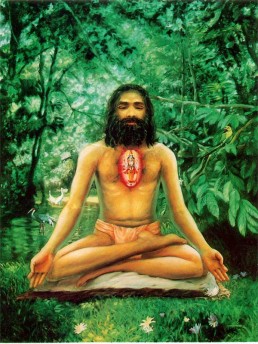Swami Chinmayananda Commentary
In the previous stanza it was indicated that the man of perfection develops equal-vision as far as things of the world are concerned. The universe is not made of things alone, but is constituted of beings also. Now the doubt arises, what will be the relationship of a perfect man of equipoise with the living kingdom of beings around him? Will he negate the whole lot as unreal? In his preoccupations with the experience of the Eternal and the Immortal, which is the substratum for the entire world of changing phenomenal beings, will he ignore to serve the world and help the living generation? This idea is taken up here for discussion.
Such a man of excellence, says Krishna, regards all relationships with an equal love and consideration, be they “FRIENDS, OR FOES, OR INDIFFERENT OR NEUTRAL, OR HATEFUL, OR NEAREST RELATIONS.” In his equal-vision, all of them are equally important and he embraces, in his Infinitude, all of them with the same warmth and ardour.
His love knows no distinction between the righteous and the unrighteous, the good and the bad. To him a sinner is but an ego living in its misunderstandings, since sin is only a mistake of the soul and not a positive blasphemy against Itself. Rama Tirtha beautifully expresses it when he says that “we are punished BY the sin and not FOR it.”
In the right understanding of his own Self and the resulting realisation of his own Self, he becomes the Self everywhere. He discovers a unity in the perceived diversity and a subtle rhythm in the obvious discord in the world outside. To him, who has realised himself to be the Self which is all-pervading, the entire universe becomes his own Self, and therefore, his relationship with every other part of the universe is equal and same. Whether I get wounded in the hand or the leg, on the back or in the front, on the head or on the shoulder, it is the same to me, since I am equally identifying with my head, my trunk, and my legs, as myself.
THROUGH WHAT METHODS CAN ONE ATTAIN THIS HIGHEST GOAL AND ASSURE FOR HIMSELF THE SUREST RESULT? IT IS EXPLAINED:
Adi Sankara Commentary
The first line of the verse beginning with ‘benefactor,’ etc. is a single compound word. Visisyate, he excels, i.e. he is the best among all those who are established in Yoga-(a different reading is vimucyate, he becomes free); sama-buddhih, who has sameness of view, i.e. whose mind is not engaged with the question of who one is and what he does; with regard to a suhrd, benefactor-one who does some good without consideration of return; mitram, a friend, one who is affectionate; arih, a foe; udasinah, a neutral, who sides with nobody; madhyasthah, an arbiter, who is a well-wisher of two conflicting parties; dvesyah, the hateful, who is repulsive to oneself; bandhuh, a relative;- to all these as also sadhusu, with regard to good people, who follow the scriptures; api ca, and even; papesu, sinners, who perform prohibited actions-with regard to all of them. Therefore, to acquire this excellent result-
The Bhagavad Gita with the commentary of Sri Sankaracharya – Translated by Alladi Mahadeva Sastry
Holy Geeta – Commentary by Swami Chinmayananda
The Bhagavad Gita by Eknath Easwaran – Best selling translation of the Bhagavad Gita
The Bhagavad Gita – Translation and Commentary by Swami Sivananda
Bhagavad Gita – Translation and Commentary by Bhaktivedanta Swami Prabupadha
Srimad Bhagavad Gita Chapter 6 – Verse 9 – 6.9 suhrn mitraryudasinam – All Bhagavad Gita (Geeta) Verses in Sanskrit, English, Transliteration, Word Meaning, Translation, Audio, Shankara Bhashya, Adi Sankaracharya Commentary and Links to Videos by Swami Chinmayananda and others – 6-9

